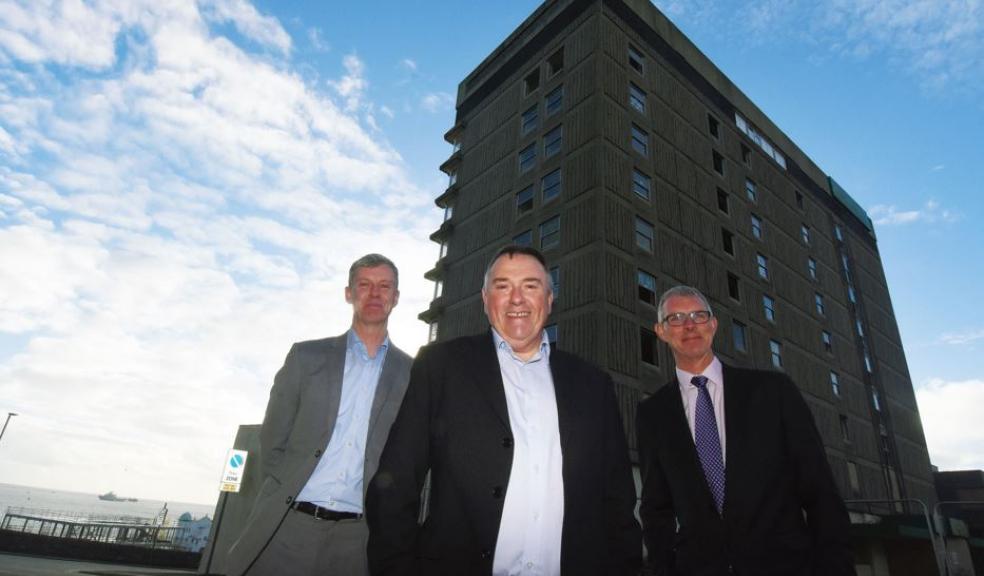
Plymouth City Council to buy Quality Hotel
Plymouth City Council is buying the Quality Hotel and will market the site, with its commanding views of the renowned Hoe and Plymouth Sound, in a bid to attract an international standard hotel.
The Council has exchanged contracts with the owners of the Quality Hotel and a report is going to Cabinet today (12 January) to give the go-ahead to buy the empty property.
The Council has already drawn up a plan of action which involves demolishing the 10-storey building as soon as practicable. Once all the contracts and completion stages of the sale have finished, the demolition will get underway. This could take place in the next few weeks.
Council leader Tudor Evans said: “This is really exciting stuff. This is the Council stepping in, making things happen for the good of the city.
“This site is unique. It has bags of potential with incredible views of the Sound and would make an amazing location for a new hotel.
“Plymouth has a shortage of hotel beds and with more and more visitors enjoying Britain’s Ocean City and the countdown to Mayflower 400 in 2020 now well underway, we need to make sure visitors book into Plymouth hotels, spend their money in Plymouth shops and hotels and help keep hundreds of Plymouth people in work.
“We are already getting 5.5 million day visitors a year but need to change this to stay visitors.
“Nothing is without risk, but we need to step in now where the market has failed so far. We cannot let this eyesore blot our stunning waterfront. We want to make it work for the city and are already talking to a number of interested parties.”
The Quality Hotel, which has built in the late 1960s, was closed two years ago and has since become a magnet for anti-social behaviour, including a number of arson attacks.
Councillor Mark Lowry, Cabinet Member for Assets and Finance said: “We have taken strong, affirmative action to address a building that is not just an eyesore but is becoming dangerous and looks appalling from the Sound.
“We believe this is a cracking site for the right developer and we are stepping in to develop the site as a marketing opportunity.”
The Council is not able at this stage to give financial information as commercially sensitive discussions are still ongoing but the sum will come from reserves.
The project will meet the Council’s ‘growing Plymouth’ and ‘confident Plymouth’ objectives by making it an attractive place for investment, meeting visitor needs with a quality hotel and creating a range of job opportunities.
Over the last year, the Quality Hotel site has been increasingly dogged by vandalism, arson and other anti-social behaviour, causing considerable distress to local residents.
Last month the Council instigated emergency work and instructed contactors to make safe some unstable windows and glass on upper floors of the building, to prevent them from falling onto the road.
The Council commissioned independent hotel consultants to carry out a market study into the city’s hotel offer and they concluded that there is a shortage of rooms as the city was attracting more visitors.
In particular, they highlighted the lack of hotel accommodation of four star and above. The consultant also recognised the Quality Hotel site as a key potential site for hotel redevelopment.
It is estimated that at least an extra 220 additional hotel beds are needed into order to achieve the city’s growth projections from overseas visitors.
Visitor numbers are expected to grow by 20 per cent to six million which will take the economic impact up to approximate £400m and create a further 1,500 jobs.
- In 2013, Plymouth had 5.2 million visitors who spent over £337.5 million in the area
- 89,000 were from overseas who spent £44.3 million.
- Tourism employs 8,625 people, seven per cent of the city’s workforce
- There are currently 24 hotels with 1,746 bedrooms. Around 86 per cent of rooms are budget, 2-star or 3-star.
- Current occupancy rates are very strong with an average annual occupancy at 78 per cent, above the regional UK average of 74 per cent. In the summer this reaches over 95 per cent capacity, largely driven by coach tour groups.











